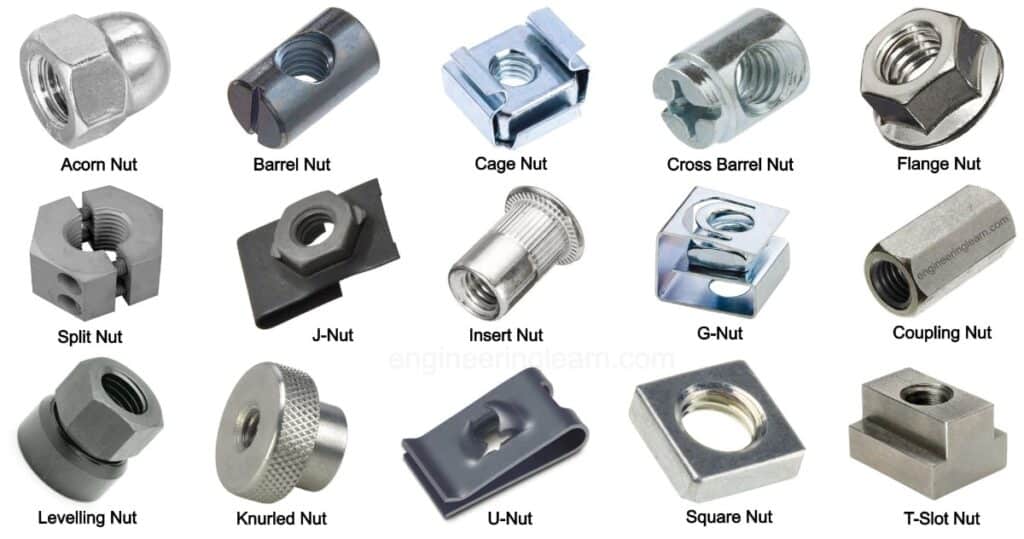In the realm of do-it-yourself endeavors, fasteners are vital that tends to be disregarded but is critical in ensuring the robustness of every build. Regardless if you are creating an innovative shelving unit, crafting home decor, or tackling a major construction endeavor, grasping the various kinds of nuts and bolts can greatly influence the results. This piece acts as an all-encompassing resource to help you sort through the countless choices at hand, ensuring that you choose the appropriate fasteners that fit your particular criteria.
Starting with hex bolts to lag bolts, and regular nuts to custom choices, the selection can be extensive. All kinds have specific applications and performance characteristics that render it appropriate in diverse settings and conditions. By examining the essentials of nuts and bolts, reviewing their applications, and looking into the different materials and finishes on offer, we intend to provide you with the information needed to select the perfect fastener for your next DIY adventure. So, whether you are a seasoned DIYer or a beginner, get set to boost your abilities and self-assurance in safely securing projects.
Types of Fasteners and Screws

While embarking on a DIY project, knowing the different types of nuts and bolts is important for picking the right fasteners for the project. Bolts are generally categorized by their style and purpose, with popular kinds comprising hex screws, carriage bolts, and lag screws. Hex bolts are preferred for their versatility and strength, while carriage screws are perfect for uses requiring a clean appearance and simple installation. Lag screws, on the contrary, are purposefully designed for heavy-duty fastening in timber due to their large, coarse spirals.
Nuts serve as the counterpart to bolts, delivering a tight fastening mechanism. There are numerous kinds of nuts, with hex fasteners being the most common in conjunction with regular screws. Other options include locking fasteners, which include a mechanism that stops loosening due to shaking, and flange nuts, which have a built-in disc for improved weight distribution. Choosing the correct fastener is essential, as it needs to match both the bolt size and the mechanical demands of the task.
In addition common fasteners and screws, unique fasteners are offered for particular uses. For example, nylon fasteners offer added safety by preventing movement, while expansion bolts are beneficial in construction work where increased holding capability is essential. Understanding these differences and their uses will enhance your DIY efforts, guaranteeing that your tasks are secure and durable.
Materials and Finishes
When selecting nuts and screws for your endeavor, the material is crucial for guaranteeing longevity and appropriateness for your particular requirements. Metal is the most common material utilized, known for its durability and adaptability. It is available in various types, which vary in tensile strength and resistance to corrosion. Stainless steel, on the other hand, offers superb resistance to oxidation and deterioration, making it perfect for external applications and environments where humidity is a factor. Other materials like bronze and aluminum are also available, each providing unique benefits: bronze is often used for its visual attractiveness and resistance to corrosion, while aluminum is favored in specialized uses due to its light and exceptionally superior weight-to-strength ratio.
Finishes also play a important role in the functionality of nuts and bolts. Different coatings can improve resistance to rust, which is crucial for fasteners exposed to the elements. Zinc plating is a common option, providing a defensive layer that prevents oxidation and deterioration. Galvanization, which involves a heavier layer of zinc metal, offers even greater protection for heavy-duty applications. Additionally, Bolts and Nuts as black oxide and ceramic coatings can improve both aesthetics and protection against degradation. Knowing these coatings can assist you choose the appropriate hardware for your setting and the longevity of your endeavor.
Finally, it is critical to consider how the selected materials and coatings interact with one another. For instance, using different metals can sometimes lead to galvanic corrosion, especially in external settings. Therefore, ensuring compatibility between nuts, screws, and the materials they will be fixed to is crucial. This understanding will not only improve the performance of your fasteners but also ensure the effectiveness and safety of your do-it-yourself endeavors.
Buying Guides and Comparative Analysis
As you choosing fasteners for your project, it is essential to understand the differences among metric and standard fasteners. Metric fasteners, that are measured in millimeters, offer greater accuracy but may not always be suitable with tools designed for imperial measurements, which are based on inches. Knowing what system your project requires can save you time and frustration. Make sure to check the specifications of the components you are working with to ensure a perfect fit.
Measuring nuts and bolts correctly is crucial to ensure that you purchase the correct size. Utilize calipers for precision and refer to sizing charts that correspond to threading standards. Standard measurements include width, length, and thread pitch, which can greatly affect the performance of the fasteners in your project. Taking these measurements accurately can help prevent costly mistakes and ensure that your assembly holds strong.
When look for quality fasteners, consider durability, material, and coating. High-grade steel, stainless steel, and corrosion-resistant coatings like zinc-coating or galvanization can significantly extend the life of your nuts and bolts, particularly in harsh environments. Consistently look for reputable manufacturers and check out reviews to gauge the reliability of the fasteners you intend to purchase. A well-informed choice will enhance the security and longevity of your DIY projects.
